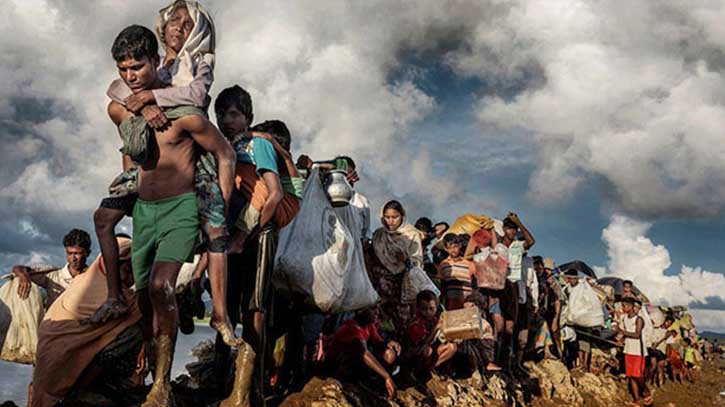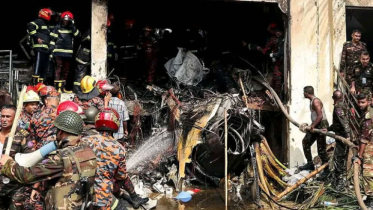
Photo: Collected
The ongoing conflict in Myanmar, particularly the Arakan Army's takeover of Mongdu city and key border outposts in Rakhine, raised concerns about the repatriation of Rohingyas and the potential for a new wave of Rohingya influx into Bangladesh.
The Rohingya leaders, along with local authorities, urge the international community to address these challenges and work toward a sustainable solution to the Rohingya crisis.
According to the Rohingya community leaders, the Myanmar junta government has some degree of accountability, but the Arakan Army, labeled a terrorist organization, operates without any such responsibility.
“While the military committed atrocities against us in 2017, the Arakan Army is now engaged in plundering our homes, brutalizing our families, and killing indiscriminately,” said a Rohingya leader at Ukhiya camp.
Rohingya leaders said the current violence in Rakhine, including the takeover of Mongdu and military camps by the Arakan Army, made the repatriation process uncertain.
They also fear that these developments could force more Rohingyas to cross into Bangladesh. However, many Rohingyas in the camps expressed willingness to return to Myanmar if their safety and citizenship rights are guaranteed.
Dr. Zubair, president of the Arakan Rohingya Society for Peace and Human Rights at Kutupalong camp, shared his experiences of past atrocities.
“When we lived in Rakhine, the junta would systematically oppress us and deny our citizenship rights. The Arakan Army, known as ‘Mog Bagi’ in Burmese, collaborated in this oppression, looting our homes and terrorizing our community,” he said.
“Today, we are displaced from our homeland, taking shelter in Bangladesh. The Arakan Army’s recent actions, such as capturing Mongdu and border camps, bring new uncertainties to the repatriation process. Unlike the junta, which has international accountability, the Arakan Army is a terrorist organization with no oversight. While we could seek justice for the junta’s atrocities at the ICC, the Arakan Army’s crimes remain unaddressed,” he said.
Dr. Zubair urged the international community, including the UN, to take decisive steps to resolve the Rohingya crisis.
“Bangladesh is not our country. We are here on humanitarian grounds. Myanmar is our homeland. If our safety and rights are ensured, we will return. How long can we live in these cramped camp shelters?” he added.
Mohammad Tayab, advisor to the Arakan Rohingya Society for Peace and Human Rights, recalled the hardships faced in 2017.
“Both the junta and Arakan Army persecuted us, forcing millions of Rohingyas to flee to Bangladesh. Later, they occupied our villages, homes, and lands in Rakhine. The junta’s actions could be taken to court, but who can hold the Arakan Army accountable?” He noted that the Arakan Army’s recent advances could lead to another influx of Rohingya refugees.
Teknaf Upazila Nirbahi Officer Sheikh Ehsan Uddin said that in response to the Arakan Army’s complete control over Mongdu and key border outposts, the Border Guard Bangladesh and Coast Guard have strengthened patrols along the Naf River to prevent illegal crossings.
Efforts were underway to maintain border security and manage potential crises, he said.
However, Ukhiya UNO Kamrul Hasan Chowdhury was unavailable for comment on the situation.
For the past 10 months, the Arakan Army and Myanmar’s military have been fighting over control of Rakhine. The Arakan Army now reportedly controls a 270-kilometer stretch of the Myanmar-Bangladesh border, including Mongdu city, military camps, and significant areas within Rakhine state.
Rohingya community leader Mohammad Shafullah, who has been residing in a camp at Ukhia in Cox’s Bazar for around seven years, told The Daily Messenger that, they did not like to live the confined life anymore and wanted to return voluntarily to their homeland without further delay on the assurance that their rights as citizens would be fulfilled.
‘We have been living here for a long time, but we cannot forget our motherland. If we even remain unfed in Myanmar, we feel we will have freedom there,’ he said..
‘We don’t know whether such a big Rohingya community would be able to return to their homeland by realising our demands. But we want to return to our country of birth. Our future is uncertain here,’ he added.
At least two attempts to start the repatriation of the displaced Rohingyas from Bangladesh to Myanmar failed, as they refused to return home without a guarantee of their citizenship and security.
On August 25, 2017, some 700,000 Rohingya men, women and children were forced to flee Myanmar as Myanmar launched attacks on them and took shelter in Bangladesh.
Messenger/Shahidul/SK/EHM








